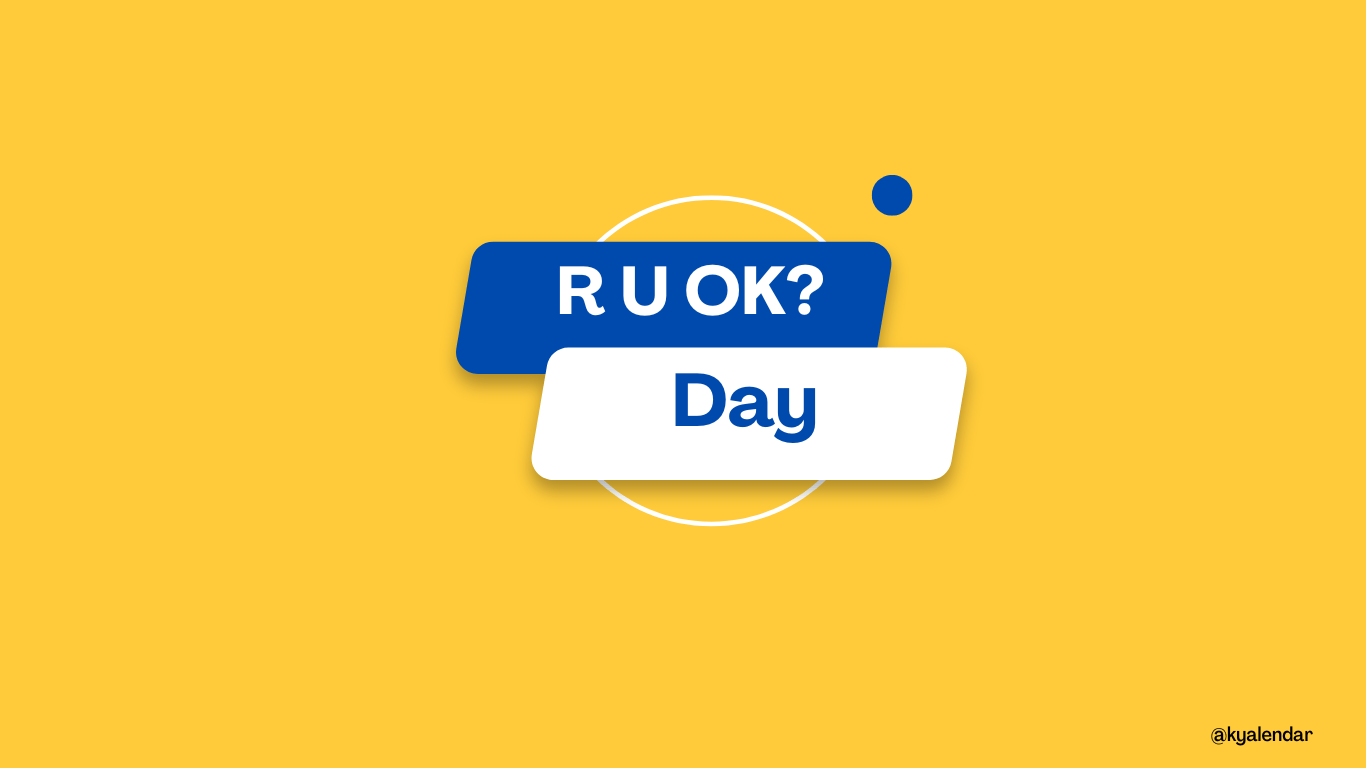
- This event has passed.
R U OK? Day
September 12

R U OK? Day is an annual event held in Australia that serves as a reminder of the importance of checking in on one another. Observed on the second Thursday of September, it is a day dedicated to encouraging meaningful conversations, particularly around mental health and emotional well-being. The core message of R U OK? Day is simple yet profound: a conversation can change a life.
The Origins and Purpose of R U OK? Day
R U OK? Day was established in 2009 by Australian Gavin Larkin, who, after losing his father to suicide, became passionate about promoting the importance of mental health conversations. Larkin recognised that a simple question—“Are you OK?”—could have a powerful impact, potentially preventing tragedies by opening up a dialogue about someone’s struggles.
The day is not just about asking the question, but also about listening, understanding, and offering support. It aims to foster a culture where people feel comfortable talking about their feelings and reaching out for help when they need it. By promoting open conversations, R U OK? Day seeks to reduce the stigma associated with mental health issues and encourage a supportive community.
The Importance of Mental Health Awareness
Mental health is a critical aspect of overall well-being, yet it is often overlooked or misunderstood. Many people suffer in silence, feeling isolated or ashamed to share their feelings. R U OK? Day highlights the importance of mental health awareness and the role that each of us can play in supporting those around us.
The day serves as a reminder that mental health struggles are not always visible. People may appear to be coping well on the surface, but underneath, they could be dealing with significant challenges. By asking someone if they’re OK, we acknowledge their experience and offer them the opportunity to share what they’re going through.
How to Participate in R U OK? Day
Participating in R U OK? Day is straightforward, yet it can have a profound impact. The key is to reach out to the people around you—friends, family, colleagues, or even acquaintances—and ask, “Are you OK?” Here are some tips on how to engage in a meaningful conversation:
- Ask the Question: Find a suitable time and place to ask someone how they’re doing. Make sure it’s a comfortable and private setting where they can speak openly.
- Listen Without Judgement: If the person chooses to share, listen attentively and without interrupting. Avoid offering solutions straight away; instead, focus on understanding their feelings.
- Encourage Action: If the person is struggling, encourage them to seek professional help or talk to someone they trust. Offer to support them in finding resources or accompanying them to an appointment if needed.
- Check-In Later: After your initial conversation, follow up with the person to see how they’re doing. Let them know that you’re there for them and that they’re not alone.
The Broader Impact of R U OK? Day
While R U OK? Day is a specific date on the calendar, its message is relevant every day. The initiative has had a significant impact across Australia, leading to increased awareness about mental health and the importance of early intervention. Schools, workplaces, and community groups across the country participate in R U OK? Day, organising events, workshops, and activities that promote mental well-being.
Moreover, R U OK? Day has sparked a global movement, with people around the world adopting the concept and using it to promote mental health awareness in their own communities. The simple act of asking someone if they’re OK has transcended borders and cultures, demonstrating the universal need for compassion and connection.
The Role of Employers and Educators
Employers and educators play a crucial role in the success of R U OK? Day. In workplaces, creating a supportive environment where employees feel comfortable discussing mental health is essential. Employers can participate in R U OK? Day by organising workshops, providing mental health resources, and encouraging open dialogue among staff.
In schools, educators can teach students about the importance of looking out for one another and provide them with the tools to support their peers. R U OK? Day activities in schools often include role-playing exercises, discussions about empathy, and lessons on how to seek help if needed.
Moving Beyond the Conversation
While R U OK? Day encourages us to start a conversation, it’s important to remember that ongoing support is crucial. One conversation can make a difference, but sustained efforts are needed to truly support someone who is struggling with their mental health. This may involve regular check-ins, helping them access professional services, or simply being a consistent presence in their life.
Furthermore, R U OK? Day serves as a reminder that it’s okay to ask for help if you’re the one struggling. Just as we are encouraged to check in on others, we should also feel empowered to reach out when we need support.
Conclusion
R U OK? Day is more than just a day; it’s a movement that emphasises the power of connection and the importance of looking out for one another. By asking a simple question and being prepared to listen, we can help create a world where everyone feels supported and valued. Whether it’s on R U OK? Day or any other day, taking the time to ask, “Are you OK?” can make all the difference. It’s a small act with the potential to change lives and foster a more compassionate and understanding society.